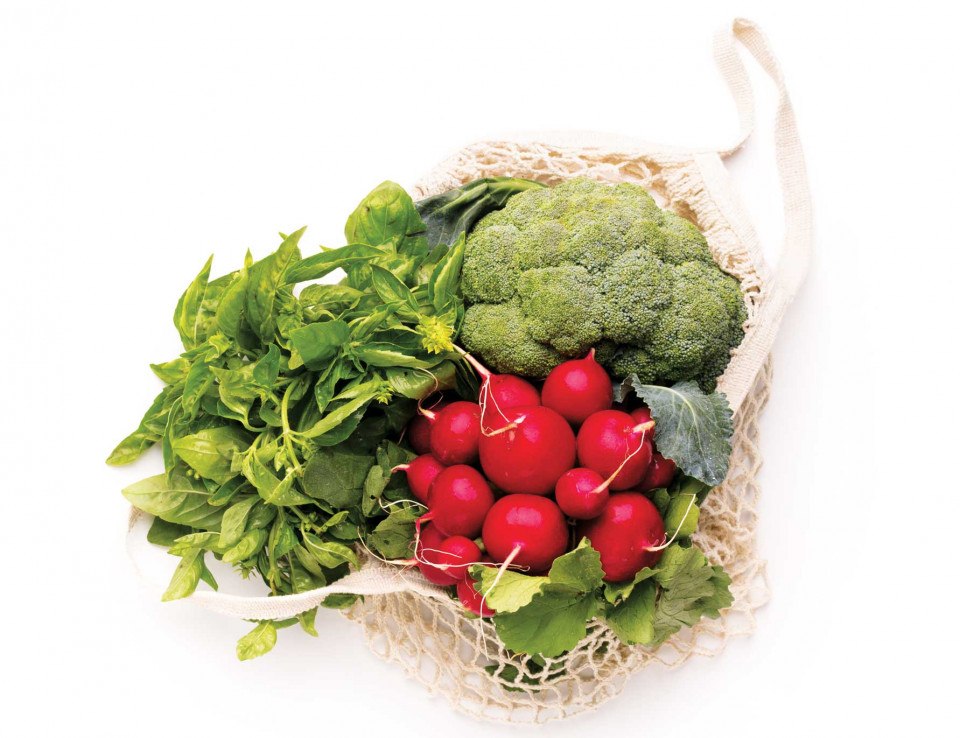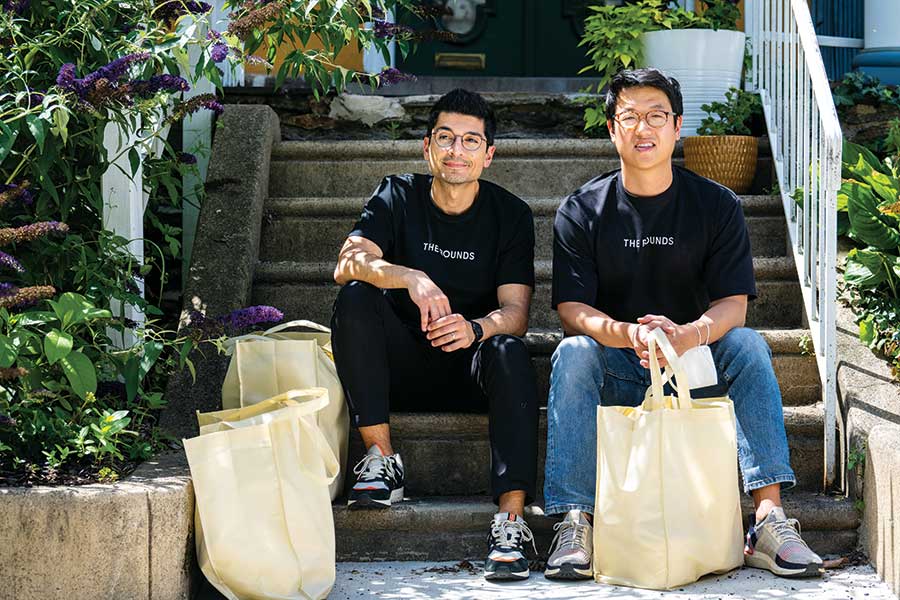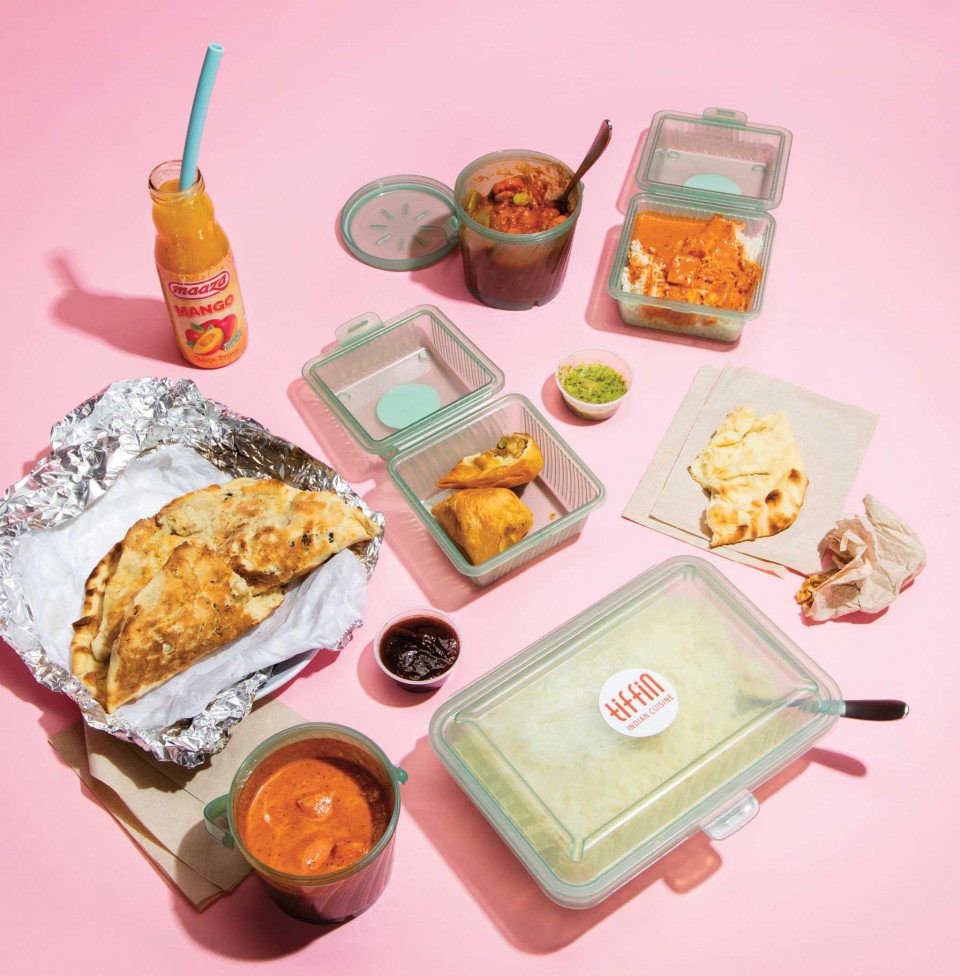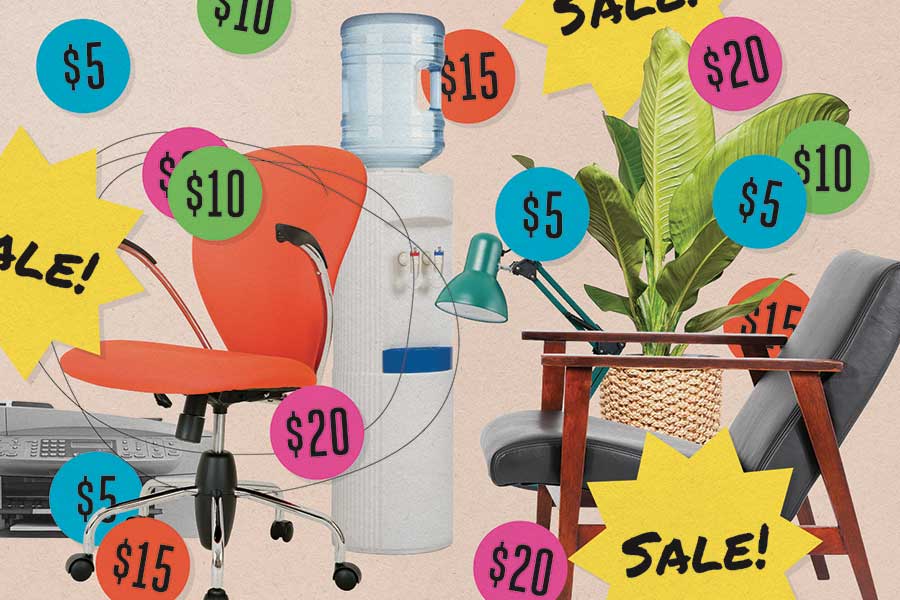From the kitchen to the closet to the backyard, reduce your waste footprint with these tips and local resources.

Reduce your waste footprint by cutting down on single-use containers. / Photograph by Nell Hoving Dixon
Philadelphians are becoming obsessed (in a good way!) with shrinking their waste footprints. Since we’re living in a climate emergency, anything we can do to slow the warming of the Earth is a good thing — and keeping trash out of landfills is one big way to fight it. Let this room-by-room sustainability guide help you stop throwing it all away.
kitchen
The USDA says the typical American household wastes 30 to 40 percent of all the food it buys. The average grocery store isn’t any better. But you’re not doomed to be this wasteful.

Photograph via Prostock-Studio/Getty Images
Shop in the Produce and Bulk Aisles
It saves you money and lets you control how much packaging you use. “As much as you can, buy loose vegetables and fruits and meats that are wrapped in paper,” says Nic Esposito, co-founder of Circular Philadelphia, which promotes reducing waste in the region. Make a habit of bringing those reusable bags, and hit up co-ops and farmers’ markets, which sell goods with minimal packaging.
Make a Freaking List
Only buy what you’re sure you’ll use. (No more tossing rotten strawberries!) Make a grocery list, stick to your meal plans, and figure out how to preserve foods near their expiration date. Freezing is typically the easiest, but there’s pickling and canning for the ambitious — look to local urban farms like Greensgrow for courses on food preservation.

The Rounds is the brainchild of co-founders (from left) Alexander Torrey and Byungwoo Ko. / Photograph by Linette and Kyle Kielinski
Subscribe for Your Staples
What if you could get the stuff you use on the reg — paper towels, quinoa, cat food — delivered to your door with little or no packaging, as often as you want? That’s what Wharton-born start-up The Rounds does for you.
Opt For Reusable Takeout Containers
The ones that popular Indian restaurant Tiffin offers in all its locations can be used up to 1,000 times each. Just specify when ordering online that you’d like the reusable options, and return them to the restaurant or a delivery driver. Local co-ops are also miserly with packaging — Weavers Way is committed to reducing plastic use and has worked with environmental consulting firm ECHO Systems to create reusable containers for its prepared foods.

Photograph by Nell Hoving Dixon
office
Working from home means you’re likely using fewer office supplies than you would in a corporate setting, with all those free printers and paper. Want to cut down even more?
Get a Separate Recycling Bin
Don’t risk sullying all that nice white printer paper with a half-eaten hoagie mindlessly tossed into your lone wastebasket. Note: Shredded paper should never go in your single-stream recycling; it falls through the cracks in the machinery and never gets reused. If you compost regularly at home, you can put your shredded paper on top of your food waste. Too busy working to think about anything else? Local startup Rabbit Recycling offers recycling containers ($7 for small, $16 for large) for all kinds of stuff municipal recycling won’t take — batteries, ink cartridges, Styrofoam, electronics, food packaging … the list goes on.
Don’t Ditch It; fix it
Or at least try! The volunteer-run Philly Fixers Guild teaches Philadelphians to repair broken technology at free “Repair Fair” events. They were on hold for the pandemic but return this spring. You can also download the YING app and join the Circular Philadelphia skill-sharing group to request service or to volunteer.
Manage Your Mailbox
Wouldn’t it be nice to only get birthday cards and Philly Mags in your mail? To cut off all those pointless credit-card and insurance offers, go to optoutprescreen.com. For fewer marketing mailings, register at DMAchoice.org and choose the mail you want and don’t. To opt out of fliers left on your property, request a circular-free property decal from L&I at Phila.gov.

Illustration by Brooks Robinson
BuyUsed
“Secondhand doesn’t mean second-rate,” Nic Esposito says. Boomerang, which acquires furniture from corporate liquidations, is great for pre-owned desks, chairs, whiteboards and other office stuff at 90 percent below retail. You can also join a “No Waste” or “Buy Nothing” group on Facebook or browse Marketplace for free or cheap used items.
Recycle E-waste the Right Way
Stumped by your shelf full of old cell phones and obsolete computers? Schedule ethical doorstep pickup of unwanted electronics (and clothing, too) from companies like Retrievr. Or ask electronics stores if they accept computers for recycling. Take batteries, light bulbs and other e-waste to the six sanitation convenience centers run by the Streets Department. Still confused? The city’s handy “Recycling Donation Finder” guide is invaluable.
The Yard
There’s a lot you can do with even a small Philly yard to reduce waste, much of which you have to do with composting. So get composting!
Invest in the Process
The natural process of recycling organic scraps into fertilizer gets a hand from local services like Bennett Compost and Circle Compost; both will pick up a bucket of your food waste weekly or bi-weekly (and give you bags of the finished product come planting season). Bennett estimates that its weekly gleanings from nearly 4,000 local households and businesses keep more than 70 tons of material out of landfills — every month.
Roll Your Own
To DIY compost, buy (or make!) a bin or tumbler, fill it with yard waste and kitchen scraps (like banana peels and coffee grounds), add a little water, and occasionally stir things up.
Get Free Materials
If you live in Philly, you can get up to 30 gallons of free organic material (like mulch and wood chips) for your garden or yard from the Fairmount Park Organic Recycling Center. All you need is proof of residence, a shovel to pick from the self-serve piles, and additional tools if you’re up for log-cutting.
The Closet
Clear it out! Millions of tons of textile waste wind up in US landfills every year. Moving company Movinga says Americans only use about 20 percent of what’s in our closets.

A look from Lobo Mau’s spring 2022 no-waste fashion and home decor collection / Photograph by Tamarama Studios
Invest in Durable, Sustainable Clothing
The lifespan of fast-fashion items like those from Shein or Forever 21 is brief, and packaging waste from online retailers is significant. “We have to stop buying clothing that’s going to fall apart in six months,” Nic Esposito says. Instead, rent from services like Rent the Runway; swap with friends; invest in sustainable pieces that last — local zero-waste brands like Grant Blvd and Lobo Mau are solid options; or make your own. Or buy vintage!
Only Donate What Will Get Used
Some thrift stores send unsold merch to the landfill, so only donate items in decent condition. Business attire given to Dress for Success goes directly to women needing interview-friendly ensembles. Consider online secondhand sites like Poshmark. For sewing scraps, look into textile recycling companies like Fabscrap, a nonprofit that takes leftovers at its Bok Building location for $1.50 a pound.
Donate Used Blankets to Animal Shelters
Shelters and pet stores always need blankets, sheets and towels to keep critters warm and clean.
Upcycle Tattered Textiles
Got goods too worn to be donated, such as sheets or towels? Wax creative and use them inside your home. Converting them into rags for cleaning is an easy way to reduce paper-towel waste.
Rethink Disposable Diapers
Let this sink in: The average newborn uses eight to 12 diapers a day. It’s worth considering cloth or single-use bamboo nappies (such as Andy Pandy), which are more biodegradable than traditional disposables. Cloth diapers can also be tough on the environment, so wash full loads in cold water and line-dry. Nesting House in Mount Airy offers free Cloth Diapering 101 classes for curious parents.
Published as “Reduce. Reuse. Revolt!” in the April issue of philadelphia magazine.

